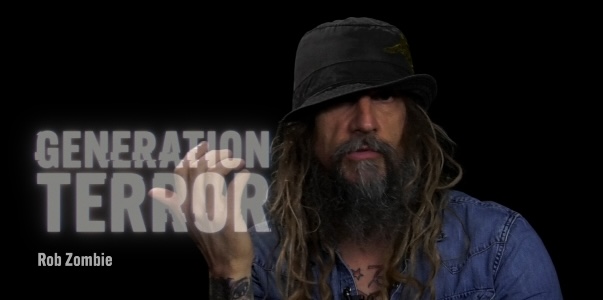Overall, the horror films of the 2000s aren’t best known for their quality. Viewed in many ways as a low point for the genre as a whole, characterized by “excess”–– in style, in the graphic nature of their violence, in their heightened tone and their often overtly misogyny–– that decade’s horror output is still typically dismissed as “torture porn.” The new documentary Generation Terror, then, is refreshing in its positive approach to exploring this lesser-loved corner of a genre whose fans have only recently found a modicum of respectability. Beginning with a run of rapid montage that’s sure to make any child of the aughts nostalgic for the grainy, gritty stylings of the early Saw franchise, the film is lighthearted and affectionate, part hagiography (and part tacit apologia) for the newly “elevated” genre’s red-headed (and handed) Millennial stepchild. While die-hard aficionados may not learn a tremendous amount of new information, they’re sure to enjoy the laid-back and warm approach to the topic; meanwhile audiences whose relationship with the genre began in this disreputable age will find plenty to chew on in this fond, if scrappy, revisitation.
“The Luxury to be Nihilistic”
Directed by documentarian Sarah Appleton (The J-Horror Virus) and horror filmmaker Phillip Escott (Cruel Summer), who began working together on another Y2K-era horror doc The Found Footage Phenomenon (2021),Generation Terror’s greatest strength is its deep familiarity with and access to its topic. Interview subjects include a parade of writers and directors whose work shaped the decade, from cult filmmakers Rob and Sheri Moon Zombie (House of 1000 Corpses etc.) to Jeffrey Reddick, who wrote Final Destination, to Srdjan Spasojevic, whose classic A Serbian Film (2010) remains a contender for most disturbing film ever made. With this in mind, the film often feels pleasantly like a dish session after a horror convention with old hands swapping war stories from a time everyone acknowledges was tough even as they share fond memories.

Most of the film is loose, playfully and enjoyably hopping from subject to subject and theme to theme with relish; one critic, Ariel Powers-Schuab, describes the experience of enjoying torture porn at the time as a “badge of honor” and a way of fostering community with likeminded genre fans, emphasizing the clubby atmosphere of the subjects.
Torture Porn
At the same time, the chorus of filmmakers bemoans the studio-mandated wave of horror remakes (The Hills Have Eyes [2006], Black Christmas [2006], Friday the 13th [2009], I Spit on Your Grave [2010], etc.), arguing in essence that remakes were the only way to get work at the time. Multiple bristle at the term “torture porn” (with one suggesting “karma porn” would be a better term) and one critic acknowledges they never enjoyed watching even the arthouse iterations of this hyper-gory, brutal subgenre at the time. The screenwriter of the I Spit on Your Grave remake mounts a not-so-convincing defense of his work as reparative rather than misogynistic relative to the original rape revenge film (suggesting he had to make the sexual assault against the female protagonist especially “horrible” to “justify” her violent revenge). This example is telling: The elephant in the room is this facet of the decade’s output–– contemporaneous or current discussions of these films’ violence against women is left unexplored, even as critics toss of references to the 2000s as the “Naughties” (i.e. the “naughty aughties” that brought us “girls gone wild,” the Victoria’s Secret Fashion Show and the slut shaming of former Disney stars) without elaboration.
For its looseness, Generation Terror also mounts a series of cogent (if somewhat familiar) arguments for the decade as the “unfinished business” of the nineties. The film begins by contextualizing the 2000s with political threads from the end of the millennium–– the dissolution of the Soviet Union, the economic prosperity of the later Clinton years, Y2K–– and a brief history of the tsunami of teen horror on the market, which one subject calls a “path of mediocrity.” Eventually turning to the contested 2000 election, 9/11, and the Iraq war, the subjects construct a compelling case for the generic potency of this period’s violence as a reaction against the desensitization caused by violence on the news akin to the Vietnam war, as well as a response to newfound political polarization during the Bush years and a consequence of the anxiety undergirding the previous administration’s tenure.
Conclusion
As a horror fan, growing up in the 2000s meant horror and pornography were viewed as barely more than two sides of the same coin (if not the same side). Only later was I able to brush the gore from my eyes and investigate the era’s merits, from the New French Extremity to the homegrown video weirdness of films like Rob Zombie’s wonderful The Lords of Salem. For viewers with a similar experience–– or even for those who haven’t gone back to reconsider the genre as much more than a monolithic embarrassment–– Generation Terror proves a refreshing revitalization of the nuances under all the blood and guts, as well as the guts themselves.
Does content like this matter to you?
Become a Member and support film journalism. Unlock access to all of Film Inquiry`s great articles. Join a community of like-minded readers who are passionate about cinema - get access to our private members Network, give back to independent filmmakers, and more.